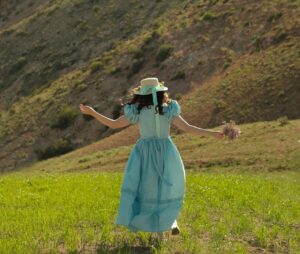TRANSLATED FROM THE SERBIAN BY MARIJA BERGAM PELLICANI
SOMEONE ELSE’S CINDERELLA
For grandma Stana
It’s decent weather,
totes and antediluvian leather bags are schlepping
their old ladies with bluish reflections in their curled hair,
behind whom I always slow down,
I observe them walk, as they swing their hands and
unkissed napes,
a thought flares up in my throat:
I’ll suddenly walk around her, startle her a little,
and smile— like— it’s me!
But it’s not her, of course.
She up and left
her workplace here on earth
off to collect the fat paycheck that
down here she never asked of anyone, for anything.
It is a thought that nevertheless allows
me to pick up my pace.
The way she hauled her brothers and sisters
from rock to mud,
and now, without complaining about the culture shock
or the begrudging neighbours,
she fell off her perch,
grown thin with the thoughts devouring her insides
like in that adage
she fell back on when the need arose:
“What do you need a guy for – to chew on your bones?”
I glance sideways into the face under the hairdo,
someone else’s Cinderella.
Still, why not say something:
I remember our last
meaningful conversation,
you showed me the treetops against the window
and the strange shapes inside them,
don’t worry, they have stayed here between us,
I regularly chase away your ghosts,
your dementors.
ORIENTATION
Probably there still stands that residential block where you went
with your boyfriend of old on one of those tense walks
during which he would dissect your memories of others,
or maybe it was just a simple, lovers’ walk,
when with your hand you lightly brush the playground jungle gym,
poking the ground with your sneaker, while you wait for him to tie his shoe
or buy some water or something to that effect.
Though, at the time, people didn’t really buy water and they would somehow
survive the average walk without a plastic bottle
and come back home yearning for something.
You, perhaps, yearning for solitude. For unembargoed flashbacks.
None of your people live there, no reason to unlock the picture,
there is nothing in it but the surface, the apparition
of something that didn’t really have to happen
in order for you to stand where you are.
And yet, compared to other, repeated, successive pathways,
the same conversational and other contents,
you remember this unrepeated one: between the yellow-grey buildings,
along the overpass across the tracks,
you remember it, so to speak, because you cannot entirely rely on the fact
that your mental picture hasn’t been glued over the authentic one,
like a futile spice of mystery, novelty, initiative.
Google street view doesn’t show anything similar, and why should it?
This too should suffice.
That hasn’t stopped you before from writing the story
of another former boyfriend, about how the local kids
broke his nose so he bled in the bus on the long way home,
precisely into that space, slippery, blurred on the margins,
selectively obscure, but evidently quite exciting.
In a place like that Branko would have made a flower sprout.1
1 The reference is to the celebrated neo-symbolist Serbian poet Branko Miljković (1934-1961). In his poems the flower recurrently figures as a symbol of creativity and hope.
THE BAIT
There is no word for that state of turned up interior.
Perhaps, best of all:
like a fish still on the hook,
stretched over your filthy, child’s palm,
only its tail sticking out a little.
Its scales easily rub off against your fingernails as it tingles with insanity,
caught for the first time.
And you, madly focused on that eye
dissolving you through the unseemly lenses of air, and that mouth,
a wound you won’t instantly and scrupulously deliver from the sting.
Now that twitch,
that impetuous attempt to peel off from your palm,
although they are so cruelly compatible,
two, three times, hopeless,
but with the moral imperative you’re reading into it,
that’s what I’m talking about.
The flickering, the twitch from the diaphragm, like a forgotten hook,
out of nowhere, then the questioning,
anywhere at all: at the bus station,
above the sink, in front of the sun-blinded window.
It’s been a long time since you stopped feeling the hook
and you slide the worm onto it indifferently,
grown up women don’t do that.
Something else, cold and dumb, glistens white on their palms,
before they put it back, always jauntily, under the glittery surface.
But the fingertips tingle for a while,
as if alive.
These poems have been previously published on www.versopolis.com and are reproduced here with the author’s consent.
Also, read Morning Tea and Other Poems by Sabahattin Kudret Aksal, translated from the Turkish by Neil P. Doherty, and published in The Antonym:
Follow The Antonym’s Facebook page and Instagram account for more content and exciting updates.




























0 Comments